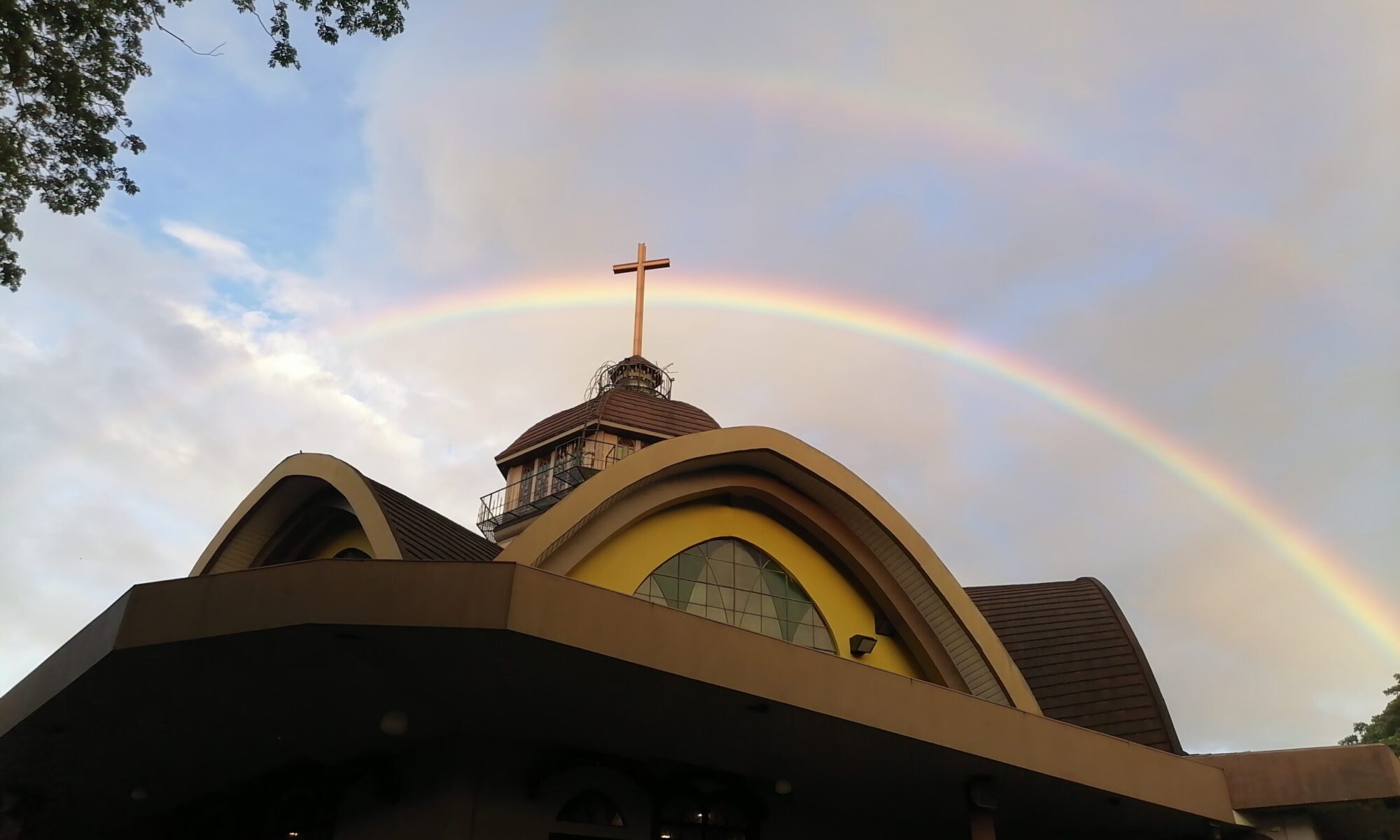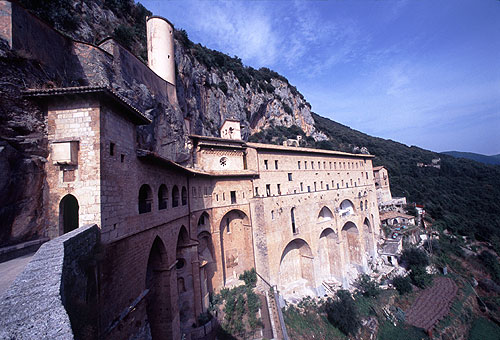The teachings of the Catholic Church can be compared to a jig saw puzzle. The, sometimes, thousand of parts are so made that they cling to one another like a leach. If you lift one part you can lift the whole thing because by design they cling to one another.
The same with the truths of the Catholic Church. They cling to one another. Remove one part and the whole structure collapses. St. James described it thus; disobedience to one is disobedience to all. rejection of one truth is rejection of all truths. Rejection of one morals is rejection of all morals. If you commit adultery, you are guilty of murder, stealing, lying, homosexuality, etc.
Christ commanded us to pray without ceasing. If you disobey the command on how to pray, you disobey all the other commands.
Though sinners end up disobeying all the commands of Christ by their disobedience to one command, there is, often, that one specific command that he had disobeyed that, as a consequence, caused the disobedience to all the commands. He must find out what is that specific command. True repentance for that specific command can remove all the rest of the sins that came with that one disobedience.
So in analyzing the complete lost of Faith in the Church, know that the lost of Faith is, often, due to the one disobedience to God’s command that is equivalent to disobedience to all. In conversion, just discover that one specific sin that caused the avalanche of sins. This sins is described by St. Thomas of Aquinas as the ‘predominant sin.’
Of course, the predominant sin could, also, be a hundred predominant sins
But for now, let us concentrate on one predominant sin of the Catholic Church today. This is the inability to obey the command of Christ to pray as Christ commanded,….. without ceasing. This is a sin against Faith. This is the one sin that has caused the destruction of souls today. The Church cannot be destroyed because it always prays unceasingly, that is why she was called ‘ecclesia orans’ before.
1. According to Divine Revelation, the life of repentance that leads to Faith consist of three acts; fasting, prayer and good works. Among the three, prayer is what makes fasting and good works pleasing to God and vice versa, fasting and good works makes our prayer pleasing to God.
2. Fasting is essentially fasting of the senses for the avoidance of evil. Evil must be avoided. But many do not know what is evil. Many in the Vatican do not know that adultery is evil.
So prayer is needed to know what is evil. Evil cannot be known without the actual grace that comes from prayer.
When evil is known, it is still difficult to avoid evil. So again, prayer is needed to be able to avoid evil.
So Fasting and prayer always go together. While fasting helps us avoid hell, it is good works that helps us go to heaven.
3. The superior Christian good works can not be known without prayer. The way a true Christian feeds the hungry is superior to the way an ordinary care giver feeds an octogenarian. Prayer is needed to know what are the New Testament good works. So Good works and prayer must go hand in hand.
And when we know what is good, it is still impossible to do that good. So again prayer is needed to enable us to do that good. Good works and prayer go hand in hand.
So we have the three elements of repentance; fasting, prayer and good works. Prayer stands in the center to enable man to fast and perform good works. Pope Benedict emphasized this at the end of his encyclical ‘Deus Caritas est.’
4. Repentance is unceasing fasting, prayer and good works. But it is prayer that must really be unceasing; because it is difficult to fast and do good works unceasingly. It could kill.
Unceasing prayer is a sign of Faith, thus, a sure supernatural sign of Catholicity. The lack of which is a sign that one has no Faith and, therefore, not a Catholic.
5. What is unceasing prayer? It is the intellectual consciousness of one’s sinful presence before the majestic justice of God during one’s wakeful hours without having to utter a single word. Words, songs, gestures and other movements may be added to enhance it but they would not be an important part of unceasing prayer.
In the concrete, it is the activity of the mind and heart in the presence of God with the aid of the 150 psalms during one’s wakeful hours. When done well, this continues even during sleeping hours. Thus prayer becomes, indeed, unceasing.
6. Gradual development.
It is impossible to pray unceasingly right away. It is a gradual process; from praying a few minutes a day to eventually praying the whole of one’s waking hour.
Again, when is prayer unceasing? Since it is impossible to gauge prayer, let us try to gauge it quantitatively. Unceasing prayer would be —-intellectual consciousness of one’s sinfulness in the presence of the Just God, with the agreement of the will to one’s state of soul and the intellect’s efforts to use the intellectual knowledge of the 150 psalms in the period of one day. This is how the first monks, the first lay Christians, prayed.
7. Coming down to the minimum
The above description of unceasing prayer is impossible for most. Is it that difficult to enter the Kingdom of heaven? Well, Christ said ‘yes.’
But Christ considered the weak in the Church and had established ‘minimums’ below which we cannot go to heaven. In the history of Christianity this was lessen into praying with one’s mind and will, with the aid of the 150 psalms spread out in a week in eight divided Divine Offices while making ejaculations in between the eight Divine Offices. This was what was adapted by St. Benedict in his Holy Rule. He calls it the minimum, or the prayer for beginners in the spiritual life. We are not supposed to remain there. We must grow to the higher degrees of prayer.
8. The Official Liturgical prayer of the Catholic Church.
The eight Divine Office became the official liturgical prayer of the Catholic Church. This prayer is an intellectual act with the concurrence of the will during the whole waking hour. This prayer aided by 150 psalms spread out in a week. Anything less than this is no longer unceasing prayer.
9. The deterioration of prayer in the Church.
With Vatican II, the liturgical prayer for diocesan priests was reduced to 3 or 5 out of 8 divine office, i. e. around 150 psalms a month.
10. The devil had been around.
When the Church had been first established by Christ, He chained the generals among the devil to allow His Church to grow easily while He continued to allow the private among the devil to continue to test the Church. When the first apostles tried to fight these privates they could not win. Asking Christ how come, Christ answered; ‘This kind can only be driven by fasting and prayer.’ And these were the privates!
The high ranking devils were scheduled to be released after God had given the Church enough time to develop in relative peace. The gradual release seems to have started with Pope Pius IX and is in full blast at the beginning of the 20th century. With Vatican II the Church is in the eye of the storm. Complete devastation can be seen all around. The destruction of dogmas, of morals, of the governments, of families, of the sexes, of the ecology, of the psyche of religious, priests, bishops and cardinals….and the destruction of the office of the Papacy.
If the privates among the devil could not be overcome by the apostles who were praying the minimum as described by St. Benedict, do you think you can overcome the Generals with the same minimum? Of course not.
And from the Pope down to the cardinals, bishops, all diocesan priest, priests and religious brothers and nuns are just doing one third of the dosage of the minimum, 3 or 5 Divine Office out of 8. And considering that if they pray less, they would surely lessen their fasting, good works and private prayer in between!
11. The losing battle.
With the entire hierarchy, from Pope (since the Jesuits are not known for Liturgical prayer) down to the parish priest, the new instructions to pray is under prescribed (like drinking one anti-biotic when the prescription calls for 5 a day.) they would not even have enough spiritual energy to save their own souls. How much more to save other souls.
They will not be able to fight the generals; not even the privates, not even the baby devils. They cannot help anybody. ‘Without Me you can do nothing.’ We possess Him through prayer, fasting and good works as He grants us the gift of Faith. How do we know this state of the Church? Because Christ prophesied it. And the past Popes with the collaboration of the Blessed Virgin had announced that we are in that age.
12. These high ranking devils can only be overcome with unceasing prayer and fasting. With reduced prayer and minimized fasting, the Catholic church is at the mercy of the evil spirits. And this is the situation in the Church today. The evil spirit had completely overwhelmed the Church.
With the whole world under the power of the devil, as Christ Himself described it in the Mount of temptation, from whom can we learn the way to heaven? From no human being, neither priests nor Pope. From whom then, for goodness sake?
The Advent Liturgy, as usual, gives us the right answer. From angels and from stars. As long as, like the shepherds, we leave our homes, our families, the cities and stay in vast, empty fields watching over the goodness, the sheep. that is in our souls and driving away the evil, like the wolves, in our hearts . If we are like the Magi, looking and studying only heavenly things, like the stars. If and when we are completely detached and unconcerned with the things of the world like them, then we shall learn from angels and stars, not from men. And this is the ‘new’ evangelization of John Paul II and Benedict XVI….the only sure way to learn how to be saved during these very bad times when the generals among the devils are at war with the Church in this last battle for souls. We shall learn from ‘unceasing prayer’ as we go to our rooms and lock the door, as the Gospel says.
13. The Shepherds and Magi were not evangelized by missionaries. There were none that time. Neither Chesterton, Newman, Hyde, Benson, Knox. Those excellent converts to Catholicism. And though converts, they defended the Church as the Fathers of the Church did before them. No, they did not learn from missionaries of mercy, nor from seminaries in Louvain or in Rome. They learned from ‘unceasing prayer,’ using their intellect and free will, praying the 150 psalms in a day, or at least in a week and as much ejaculations in between. “Unceasing prayer” is the ‘new’ evangelization of John Paul II and Benedict XVI; not the ‘new’ evangelization propagated after the Bishop’s Synod of 2012 up to the present.


